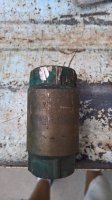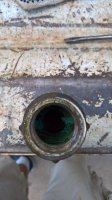You are using an out of date browser. It may not display this or other websites correctly.
You should upgrade or use an alternative browser.
You should upgrade or use an alternative browser.
Is check valve at pressure tank necessary?
- Thread starter Qwertyjjj
- Start date
Users who are viewing this thread
Total: 3 (members: 0, guests: 3)
Sponsor
Paid Advertisement
Craigpump
In the Trades
It is normally better to not have a check valve at a pressure tank that is connected to a submersible pump.
False.
I've installed 100's, maybe 1000's of tanks over the years with check valves on the tank with no issues what so ever. For example, this WX252 was installed in 1971 and still has the original installation fittings in place.
Attachments
1. What is the advantage of having a check valve at the input to the pressure tank when using a submersible pump?False.
2. What is the rational of Connecticut requiring a check valve at the input to the pressure tank?
and less that a few dozen had an issue? Or are you saying that none of the systems that you installed had a related issue?I've installed 100's, maybe 1000's of tanks over the years with check valves on the tank with no issues what so ever.
Craigpump
In the Trades
I've never had a call back due to a faulty check valve on the tank. Never had a water hammer issue with a check valve on the tank and one on the pump. The ONLY complaint I've gotten is that on occasion the springs will be a little weak and the dart will rattle when the pump runs.
The only advantage I can see is that if the check valve on the pump fails, the entire system won't drain back through the pump and create a short cycle situation.
The only advantage I can see is that if the check valve on the pump fails, the entire system won't drain back through the pump and create a short cycle situation.
Never had a water hammer issue with a check valve on the tank and one on the pump.
The only advantage I can see is that if the check valve on the pump fails, the entire system won't drain back through the pump and create a short cycle situation.
The check valve on the pump failing or just closing slower than the other check(s) is what causes water hammer. I know I only get the worst of the worst. By the time someone calls me they have figured out a larger tank or three didn't help, extra check valves didn't help, or they have had noting but problems like with a VFD type system. But I will bet I tell at least 10 people a month to remove the above ground or extra check valve(s) to stop the water hammer thump that is happening when the pump starts. Of course the water hammer goes away. And 9 times out of 10 the extra pressure on bottom check from removing the top check makes the bottom check start working just fine and it doesn't need replacing.
As long as you don't have any problems, the extra check valve doesn't hurt anything. I have installed thousands of tanks without an extra check valve, as I have always had fewer problems that way. 98 out of 100 will never have a problem with the extra check valve, but all my customers are the other 2 out of 100.
Craigpump
In the Trades
I think it would be interesting to track whether the water hammer is occurring with higher volume pumps. Around here, our typical installation uses either a 5 or 7 GPM pump, maybe that's why I'm not seeing water hammer issues on my installations.
I think it would be interesting to track whether the water hammer is occurring with higher volume pumps. Around here, our typical installation uses either a 5 or 7 GPM pump, maybe that's why I'm not seeing water hammer issues on my installations.
Higher volume pumps do cause water hammer more than lower volume pumps. It has a lot to do with velocity. But I will bet that even with a 5 or 7 GPM pump you will see a tremendous pressure spike on pump start if you put a gauge between the checks, like at the well head.
I thought we went over all this already?https://terrylove.com/forums/index.php?threads/wwj-six-reasons-submersibles-fail.64888/ and how they can last a long time because I seen plenty of them too but I have also seen them fail by the tank and how we know they were installed by plumbers. The other pump installers don't install check valves at the tank either unless they have a multiple well system, so you can work on the one well that's down and still keep them in water but they do install the extra check valve in the well that's recommend every 200'. Everyone is waiting on me to pull the second check valve on my uncle's system (I am still looking for a one check valve system, where the static water level drops to around 200' and what happens at pump shut off). I have also shown how multiple check valves in the well, can make your drop pipe,pump, and check valves last a long time, when it could've been short lived with just the one check valve.
Yes we have been over this many times. And you were the one who posted this excellent video of the tremendous water hammer multiple check valves cause.
You also posted this video of a system with a CSV that shows how it completely eliminated any water hammer.
You also posted this video of a system with a CSV that shows how it completely eliminated any water hammer.
It doesn't harm the system and that's what you want, we use them because if you use only one check in our area, you will have problems from broken drop pipe, check valve not holding, pump goes out early, so using multiple check valves will help with all those problems.
It doesn't harm the system and that's what you want, we use them because if you use only one check in our area, you will have problems from broken drop pipe, check valve not holding, pump goes out early, so using multiple check valves will help with all those problems.
So you don't think that pressure gauge bouncing and wrapping all the way around past 100 every time the pump starts or stops is hurting anything? That is hard on everything. And your broken drop pipe, check valves not holding, and pumps going out early are all from cycling on and off way too much. The extra check valves you are using are causing most of those problems, and it is compounded by every pump cycle.
I am only going off of what I see and it's just what I said " It doesn't hurt the system". You can cycle the pump as much as you want and still see the drop pipe and check valves outlasting our old pumps, where you won't see this long life in our area only using one check valve.
Last edited:
Your video is not lying to you. More than one check valve causes massive water hammer. And if the pump and equipment are surviving that abuse for any length of time, it it just plain luck.
ThirdGenPump
In the Trades
I wouldn't say it's luck. A check valve at the tank is pretty standard operating procedure around here, systems that have been in service for decades. Multiple check valve systems don't appear to have a shorter than average life expectancy.
I wouldn't say it's luck. A check valve at the tank is pretty standard operating procedure around here, systems that have been in service for decades. Multiple check valve systems don't appear to have a shorter than average life expectancy.
People use multiple check valves because it has always been the standard operating procedure. It got started when we all used galvanized tanks with the air charge system that needed the above ground check valve with the Schrader attached. But the air below the second check valve is what kept those extra check valves from causing water hammer. After we switched to bladder tanks, the extra check valve was just ingrained in our heads and stayed on because it was standard operating procedure. But since there is no air cushion below the extra check on a bladder tank system, they cause tremendous water hammer. Anyone who has put pressure gauges on a system with multiple checks and compared it to a system with only a single check will see how much water hammer the extra check valves cause.
For me it was seeing this on the larger pump systems that showed me more than one check valve was the cause of water hammer. When you see 400' of 4" steel pipe with a 50HP pump on the end jump two feet up and slam down on the well plate during pump start, it will scare you to death. Then when you take out the extra check valve and the jumping pipe goes away, it proves the extra check valve was the problem. When you realize the same thing happens even with a small pump, you never use and extra check valve again.
Yesterday I was working with a good customer of mine with 700' of 3" pipe and three check valves down hole. He can't keep the gasket between two flanges up top from squirting out when the pump starts. The pump can only build 380 PSI, and it takes well over 1200 PSI to squirt a gasket out of a pair of flanges. He knows the extra check valves are causing the 1200+ PSI hammer that is squirting out the gasket. But his customer is adamant that he needs those extra check valves, because it only makes sense that if one check valve is good, then three would be better. As usual he is trying to blame the installer, a bad flange, or anything else for the problem. Nobody wants to have to pull 700' of 3" to remove a couple of brand new check valves. But when he gets that done today, he can SHOW the well owner that the water hammer and gasket squirting out problem has gone away. I have fixed this problem many hundreds of times by removing the extra and unneeded check valves.
The distributor wants him to install a VFD so he can soft start the pump. But the customer has already had three VFD controllers burn up in three years and is tired of paying through the nose for replacement VFD's. This is what I mean about me always getting the worst of the worst problems to solve. They only call me after three VFD's have failed and the gaskets have squirted out a couple of times. Now if the customer will listen to someone who really knows how to solve these kinds of problems, his well will be completely fixed today when they remove those extra check valves.
Water hammer is not the only problem with extra check valves. In some states like Michigan, any check valve above ground is illegal, as they know it causes a negative pressure in the pipe that could draw contamination into a clean water system. Many people don't think you can draw anything into a pipe system if there is always 40 to 60 PSI in the system. But below the top check valves there will be a negative pressure that can draw mud out of the ditch into the clean water through threads or any tiny leak.
Your one check valve has already been tested in my area and the problems went away from using 2 check valves in the well.
What problems? The only problem is the major water hammer caused by having two check valves, which is obvious in your videos. Too much cycling on/off is your problem, no matter what else you try to blame it on.
I guess you need a 700' setting of 3" pipe to jump up off the well plate and hit you in the face before you will see what is really happening.
Broken drop pipe, check valves not holding, pumps failing early from the bad water hammer on pump shutoff at deep depths to water from the static water level dropping here.
This old check valve that came from a wellxtrol dated 81 but you could tell it was from when it was a galv. tank so keep using your check valves by the tank craigpump because there is no problems even on 10gpm pumps, unless that's not long enough life for you.
This old check valve that came from a wellxtrol dated 81 but you could tell it was from when it was a galv. tank so keep using your check valves by the tank craigpump because there is no problems even on 10gpm pumps, unless that's not long enough life for you.
Attachments
Last edited:
Broken drop pipe, check valves not holding, pumps failing early from the bad water hammer on pump shutoff at deep depths to water from the static water level dropping here.
Yeah, I agree. Those are all problems caused by cycling. But as your video shows, adding an extra check valve just makes the problems caused by cycling that much worse. Notice in your videos how long you have to wait to see the gauge spike when the pump finally started or stopped? Then the water hammer happened in the blink of an eye. I guess it is kind of like war. "Hours of boredom followed by a moment of extreme terror." The point is, nothing happens when the pump is on or off. It is only when the pump starts or stops (cycling) that the pressure surges and the water hammer happens. So no matter if you use one check valve or a hundred checks valves, they are not even being used unless the pump is cycling on and off, which is the real problem.
A lot of pump guys use multiple check valves, and most of the time it doesn't much effect the longevity of the pump and system. But when it does, we have to learn what causes it so it doesn't happen again. And as I said earlier, anything that could make a pump system in a bad situation last longer, is just as good an idea for pumps that are in average everyday situations.
Similar threads
- Replies
- 1
- Views
- 147
- Replies
- 23
- Views
- 774
- Replies
- 5
- Views
- 138
- Replies
- 5
- Views
- 457



